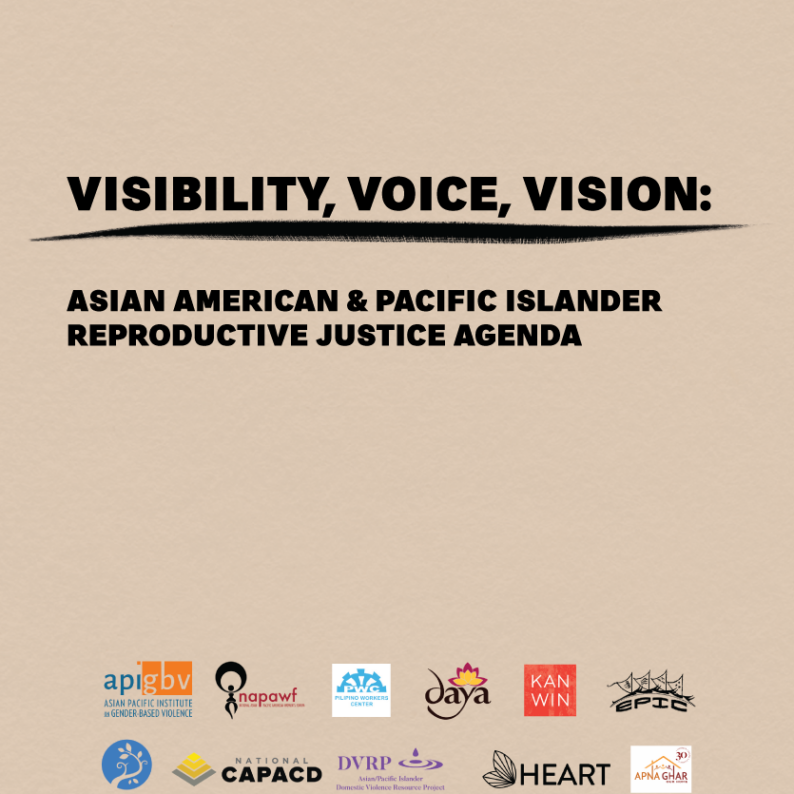Visibility, Voice, Vision: Asian American and Pacific Islander Reproductive Justice Agenda

Download One-Page Summary (PDF)
The experiences of Asian American and Pacific Islander (AAPI) women have gone unacknowledged and unaddressed by mainstream U.S. culture throughout our history in this country. Our intersecting identities and the impact of racism, sexism, and hypersexualization have become more visible as AAPI women have refused to be silent. We have marched; we have forged bonds of solidarity; and we are now moving forward collectively to create a safer, more just world for ourselves and our communities.
The National Asian Pacific American Women’s Forum (NAPAWF) and 10 other organizations serving AAPI women came together to create Visibility, Voice, Vision: Asian American and Pacific Islander Reproductive Justice Agenda. Those organizations are:
As organizations that serve AAPI women, we have been calling for long-term investment in our communities and resources for the people who need them most. The AAPI Reproductive Justice Agenda is a roadmap for leaders and decision makers on how to make those investments so that our communities can thrive.
This work was made possible through the support of Collaborative for Gender and Reproductive Equity, a sponsored project of Rockefeller Philanthropy Advisors.
What we demandWe demand:
- Immigration reform that centers families: AAPI women and their families want an accessible pathway to immigration for all without fear or intimidation.
- Accessible and affordable health care: Affordable, culturally competent, and linguistically accessible health care is a human right and critical to ensuring AAPI women can care for themselves and their families.
- Decriminalization of AAPI women’s bodies: AAPI women were the first group of people to be barred from entering the United States with the Page Act of 1875, and our bodies continue to be hyper-policed today. We must shift our approach from criminalization towards supporting communities in defining safety for themselves.
- Eradicating a culture of gender-based violence: For many AAPI women and girls, gender-based violence is an all-too-common reality and is reinforced by cultural and religious traditions and patriarchy.
- Economic opportunity and access: AAPI women are over-represented in some of the lowest-paid industries. We demand equal opportunity and access to economic programs and resources so that AAPI women and girls have the tools they need to thrive.
- Honoring and protecting AAPI neighborhoods, communities, and homelands: AAPI neighborhoods are where generations have come together and built networks of solidarity and care, and Pacific Islanders in particular are on the front lines of climate change. Protecting these neighborhoods from encroaching gentrification and increasing access to affordable housing is critical to protecting these community centers, while we must also care for our planet and mitigate the effects of climate change through an environmental justice lens.
- Ending US militarism and supporting AAPI communities impacted by it: Militarism, colonialism, and U.S. imperialism abroad continue to make their mark on our lives. It is the responsibility of the US government to acknowledge and make reparations for this devastating impact.
- Racial justice: AAPI women face intertwined racism and sexism, fueled by a perception of AAPI communities as “perpetual foreigners” and “model minorities.” Treating AAPI communities as a monolith further denies our individual identities and lived experiences.
- Language access: It is a human right to communicate in and be understood in one’s language. We want to create a future in which AAPIs have ready access to services in their language, a critical component of realizing our constitutional rights.
- Data disaggregation in all agencies: AAPIs are among the most understudied racial groups in the country. It is critical to collect, analyze and disseminate granular data on our racial and ethnic subgroups.
A note on the term AAPI
We recognize that the term AAPI has been a historical and often continued site of erasure for many marginalized groups under the broader umbrella, especially for the Pacific Islander, Southeast Asian, and South Asian communities. The Agenda’s co-creating organizations were invited with the intention of attempting to get as close to representing the full breadth and depth of the diversity of the AAPI community, and to openly acknowledge the ways we may still have fallen short of that intention — for example, native Hawaiian voices are not included in this piece. AAPI is used here in the spirit of solidarity and shared liberation, while also addressing the specific ways racism and sexism manifest themselves in each of our communities.
Priorities of AAPI WomenUnderstanding the Priorities of AAPI Women
A landmark survey commissioned by NAPAWF and conducted by The Harris Poll revealed that reproductive health and justice is a top tier concern for most AAPI women.
- Ensuring women have the authority to make decisions about their bodies and having access to affordable birth control are among the top tier issue priorities for AAPI women.
- 61 percent of AAPI women support abortion access in all or most cases. The strongest support for abortion access comes from East Asian Americans.
- 8-in-10 AAPI women feel having control over their reproduction produces more positive family outcomes.
Further insights on the poll are available to download here as a PDF.